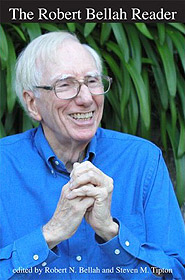Berkeleyan
Publication
The Robert Bellah Reader
![]()
Duke University Press 2006; 568 pages
13 September 2006
Robert Bellah is probably best-known for his 1985 co-authored work Habits of the Heart: Individualism and Commitment in American Life, a passionate, intellectually rigorous examination of the values that define modern America.
 |
But Bellah, Berkeley's Elliott Professor of Sociology Emeritus, has written widely during a career spanning five decades, including 30 years here on the Berkeley campus. Those not yet familiar with the range of his scholarship can catch up with The Robert Bellah Reader, a soon-to-be-published collection of 28 hand-picked essays on such topics as "Religion and the Legitimation of the American Republic," "Flaws in the Protestant Code: Theological Roots of American Individualism," and "Religious Pluralism and Religious Truth."
These titles hint at what Bellah, in the book's introduction, calls "an effort to understand the meaning of modernity," and to illuminate - in the words of the citation that accompanied his 2000 National Humanities Medal, awarded by President Bill Clinton - "the values that are at the core of our democratic institutions and of the dangers of individualism unchecked by social responsibility." In 1967's landmark "Civil Religion in America," considered one of his most influential essays and reprinted in this volume, he invokes a phrase coined by Jean-Jacques Rousseau to explain the "awareness that our nation stands under higher judgment," a moral imperative Bellah sees fueling the era's two most profound social and political upheavals, the grassroots movements for civil rights and against the Vietnam war. This civil religion, he adds - prophetically, perhaps, given the calls to conscience from today's neoconservatives and champions of American exceptionalism - "has often been used and is being used today as a cloak for petty interests and ugly passions."
Whether written in 1956 or 2006, these thoughtful, accessible essays provide crucial insights into 21st-century America, many of them based on the proposition that "religion is the key to culture." Campus readers will be particularly interested in a chapter on "University and Society," in which Bellah turns his critical eye to the business of higher education, with special attention to his alma mater, Harvard, and to Berkeley, his longtime academic home. Bellah takes aim at the "tyranny of the bottom line," issues a plea for the "true scholar" (and its essential analog, the "true university"), and explains why the U.S. neglects the humanities and social sciences at its peril. "In short," he wonders, "how, in this deeply provincial nation, do we educate citizens responsible for the whole world?"
- Barry Bergman

